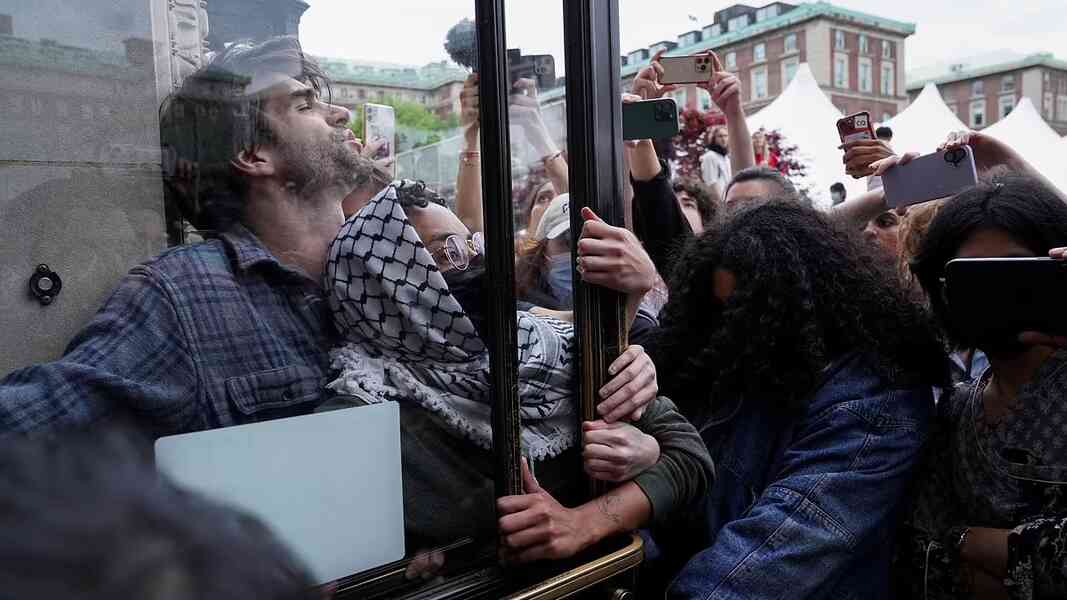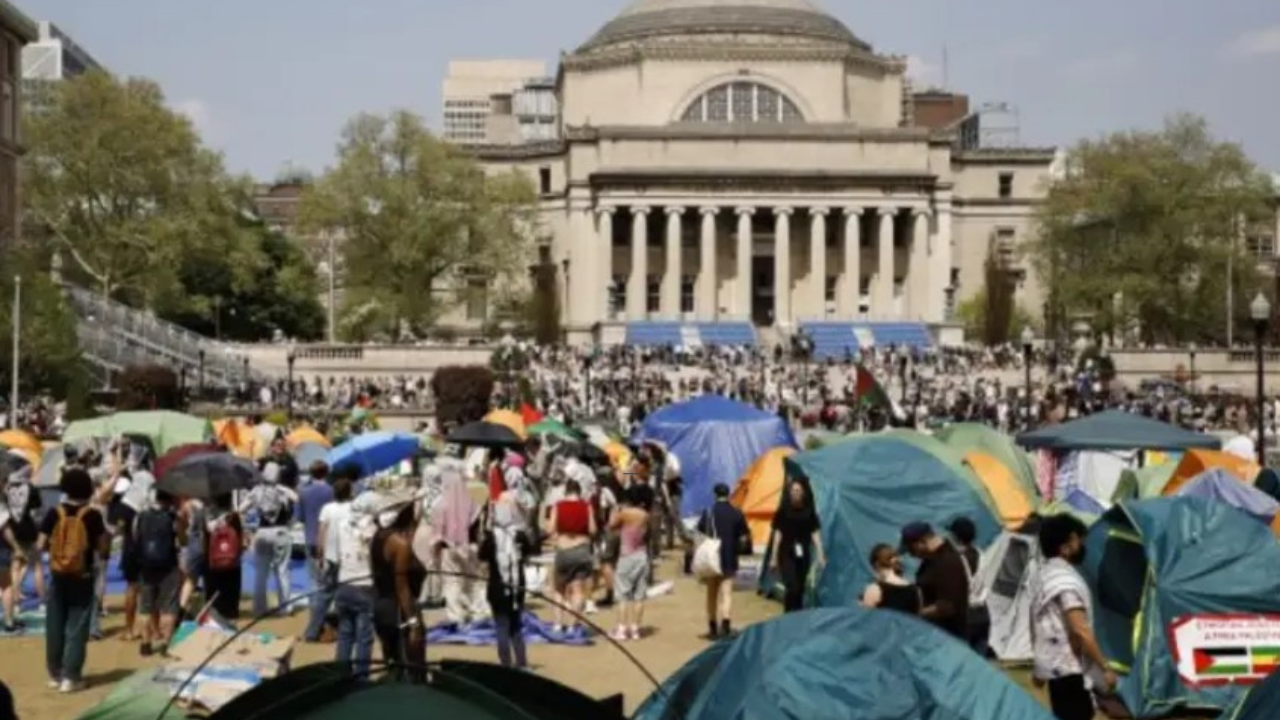Chaos Erupts at Columbia University : Protest Vortex Ignites
Students seize library in fiery standoff—why now?

On May 7, 2025, Columbia University’s campus in New York City became a battleground. Dozens of pro-Palestinian protesters stormed Butler Library, seizing the second-floor main reading room. By 7:10 p.m., New York Police Department (NYPD) officers in riot gear swarmed the six-story building, arresting 40 to 80 students, their hands bound with zip-ties. The clash, one of the largest since last year’s Gaza war protests, left two Columbia public safety officers injured in a “crowd surge.” Witnesses reported chants of “We have nothing to lose but our chains!” as police kettled demonstrators.
The Spark: Divestment Demands
The protesters, led by the student group Columbia University Apartheid Divest (CUAD), renamed the library space “Basel Al-Araj Popular University.” Their demand? Columbia must divest from funds and businesses tied to Israel’s actions in Gaza. Masked activists, many wearing keffiyehs, stood on desks with bullhorns, distributing pamphlets urging a “strike for Gaza.” The demonstration began hours earlier, with a large group flooding the library in a coordinated push. Social media posts by CUAD showed a banner reading “Strike for Gaza” unfurled inside the reading room.
University’s Response: Swift and Severe
Columbia’s acting president, Claire Shipman, issued a statement hours before the arrests. She warned protesters to leave or face disciplinary action and arrest for trespassing. When they refused, Shipman called in the NYPD, a move echoing last year’s crackdowns. The university reported disruptions in reading room 301, just days before final exams. A Columbia spokesperson confirmed two public safety officers were hurt as protesters tried to force their way into the building. By nightfall, 76 students were ushered out in zip-ties, some shouting, “You’re hurting me!”
NYPD’s Heavy Hand
The NYPD’s response was rapid. Officers arrived at Columbia’s Morningside Heights campus in force, acting on the university’s request. New York City Mayor Eric Adams posted on X at 7 p.m. ET, stating, “NYPD is entering the campus to remove individuals who are trespassing.” Videos shared by verified accounts like @ScooterCasterNY captured police pushing against hundreds marching outside Columbia’s gates. An NYPD spokesperson told CNN that “multiple individuals” faced pending charges, though specifics remain unclear.
A Year of Tension
This protest marks a resurgence of pro-Palestinian activism at Columbia, which rocked the nation last spring. In April 2024, students occupied Hamilton Hall, leading to over 200 arrests. The 2025 demonstration comes amid heightened scrutiny from the Trump administration, which cut $400 million in federal grants to Columbia in March 2025, citing the university’s handling of protests and alleged antisemitism. Columbia’s board has since negotiated with federal officials, agreeing to policies like banning masks on campus and disciplining protesters.
Voices from the Ground
Witnesses described chaos inside Butler Library. “They locked arms and wouldn’t budge,” said one student, who declined to give their name due to fear of retaliation. Social media buzzed with posts from verified accounts. @prem_thakker noted Columbia’s “collusion” with federal crackdowns, while @nytimes reported on the release of Mohsen Mahdawi, a detained protester, just days earlier. Protesters claimed they were “kettled” and prevented from leaving, while the university alleged physical confrontations with security.

Trump’s Shadow Looms
The Trump administration’s influence is undeniable. Since January 2025, federal policies have targeted universities, canceling international student visas and redirecting the Justice Department’s civil rights division to investigate campus protests. A Senate committee recently demanded Columbia turn over records about Students for Justice in Palestine, a key protest group. Critics, including faculty, call this a “crackdown on academic freedom.” Meanwhile, Jewish students like David Jonah Lederer told CNN the reforms bring “relief” after feeling unsafe during last year’s protests.
What It Means Now
The May 7 protest has immediate ripple effects. Columbia faces a delicate balance: ensuring campus safety while navigating free speech concerns. The arrests could escalate tensions, with CUAD vowing further action. Final exams, set to begin May 9, may face disruptions. Nationally, the clash fuels debates over antisemitism, Palestinian advocacy, and federal overreach. The Trump administration’s funding cuts and visa crackdowns signal a broader push against campus activism, potentially chilling dissent. For students, the stakes are personal—disciplinary hearings and deportations loom for some, like Mahmoud Khalil, detained in March 2025.
Global Echoes
Columbia’s protests don’t exist in a vacuum. Similar demonstrations have flared at Yale and Howard Universities, though smaller in scale. Globally, pro-Palestinian movements persist, from London to Cairo, as Israel’s Gaza operations continue. The October 7, 2023, Hamas attacks, which killed 1,200, and Israel’s response, which Gaza officials say killed over 30,000, remain the backdrop. Columbia’s clash reflects a world grappling with polarized views on the conflict, with campuses as flashpoints.
Faculty and Alumni Push Back
Columbia’s faculty and alumni are vocal. On April 29, 2025, hundreds joined a 25-hour “speak out” against the university’s compliance with Trump’s demands. Alumna Augusta Souza Kappner told NBC News she felt “embarrassed” by Columbia’s actions. Nearly 1,000 academics, including Noura Erakat, signed an academic boycott of Columbia, accusing it of “criminalizing protest.” Meanwhile, a lawsuit filed by the Brandeis Center alleges two Columbia janitors were assaulted during last year’s protests, highlighting safety concerns.
The Legal Fallout
Legal battles are mounting. Seven anonymous students and Mahmoud Khalil sued Columbia, challenging the Senate’s demand for protest group records. A federal judge in New Jersey ruled Khalil’s deportation case should stay there, where he was detained. Mohsen Mahdawi, freed on April 30, 2025, after ICE attempted to deport him, remains a rallying point. These cases underscore the personal toll on activists, with lawyers arguing they’re targeted for their speech.
X Buzz: A Divided Campus
X posts reflect Columbia’s divide. @EYakoby reported on secretive protest planning, while @JuliaCarmel__ criticized Columbia’s threats to suspend peaceful protesters. @Reductress satirized the university’s stance, saying protests must be “quiet and ineffective.” The platform shows both support for the protesters and calls for stricter enforcement, mirroring national polarization. Verified posts from @AP and @nytimes provide real-time updates, amplifying the story’s reach.
What’s Next?
Columbia’s administration faces a tightrope. With finals looming and protests showing no sign of fading, more clashes seem likely. The university’s new security measures—36 officers with arrest powers—signal a harder line. Yet, student organizers, emboldened by global support, plan further actions. The Trump administration’s policies will keep pressure on, potentially reshaping campus activism nationwide. For now, Columbia remains a powder keg, with the world watching.
Stay sharp with Ongoing Now 24.





